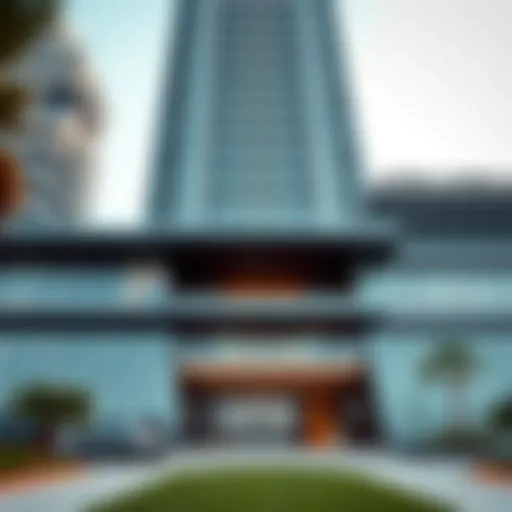Understanding Eid Holidays in the UAE: Cultural and Economic Insights
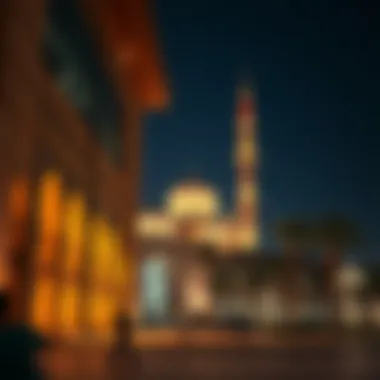

Intro
Eid in the UAE is more than just a holiday; it represents a cultural tapestry woven from centuries of tradition, family ties, and community involvement. As the crescent moon appears, marking the end of Ramadan, celebrations ignite with enthusiasm that fills the streets of cities like Dubai and Abu Dhabi. Diverse cultures come together to partake in festivities that resonate with the spirit of giving and gratitude.
Each Eid holiday, be it Eid al-Fitr or Eid al-Adha, brings distinct cultural practices and unique celebrations, attracting visitors and creating ripples in various sectors such as real estate and tourism. This guide aims to break down these celebrations to provide insight into both their cultural significance and their wider implications on the UAE's vibrant economy. The dance of tradition and modernity during these holidays shapes community life and influences market trends, making understanding these periods crucial for investors, buyers, and anyone engaging with the UAE.
This article delves into the significance of Eid holidays, the nuances of current property market trends during these festive times, and practical guidelines for buying and selling real estate in a landscape that is forever evolving.
Prolusion to Eid Celebrations in the UAE
Eid celebrations hold a special place in the fabric of Emirati culture and society. This introduction examines why these celebrations are vital, both as moments of reflection and community bonding, and lays the groundwork for a deeper understanding of the various aspects that surround them.
Eid marks significant moments in the Islamic calendar, offering opportunities for communities to come together in celebration, gratitude, and renewal. The festivities, though rooted in religious practices, also weave a broader narrative that encompasses the family, social interactions, and even economic considerations.
Historical Significance of Eid
Within historical contexts, Eid represents milestones in the Islamic tradition, inviting observance that transcends mere celebration. The two main Eid holidays—Eid al-Fitr and Eid al-Adha—trace their origins back to pivotal moments in Islamic history. Eid al-Fitr marks the end of Ramadan, a month of fasting and introspection, while Eid al-Adha commemorates the willingness of Ibrahim (Abraham) to sacrifice his son in obedience to God. This aspect of sacrifice plays a profound role in shaping the values of generosity and gratitude within the community.
Many Emiratis reflect on how the initial teachings of Islam offer timeless principles that resonate even in today's fast-paced modern lifestyle. It’s a way of honoring history and tradition, reinforcing the communal ties that enrich family and collective identities.
Cultural Importance of Eid in Emirati Society
In Emirati society, Eid operates not just as a religious observance—it’s a cultural touchstone that brings families together, strengthens communal bonds, and showcases Emirati values of hospitality and generosity. Traditional customs during Eid, such as wearing new clothes, giving Zakat (charity), and performing special prayers, reinforce a sense of belonging and pride among Emiratis.
Apart from the spiritual aspects, the celebration fosters moments of pure joy, nourishes inter-generational connections, and serves as a platform for honoring the elders and their teachings. Reflecting on the importance of family gatherings during Eid festivities, one can see how the exchange of food, laughter, and stories bridges generational gaps and nurtures social cohesion.
"Eid is not only a time for prayer and reflection; it is also a powerful reminder of the strength found in family and community ties."
In summary, the introduction to Eid celebrations in the UAE serves as a profound reminder of the rich history and cultural significance these holidays embody. This understanding is not merely academic; it shapes interpersonal relationships and echoes through the economic and social frameworks of Emirati life.
Types of Eid Celebrations
Understanding the Types of Eid Celebrations is crucial for recognizing how diverse practices contribute not just to cultural perpetuation but also to the social fabric of Emirati society. Each Eid offers its unique flavor, resonating with historical context and religious sentiments. These celebrations serve as a vehicle for community bonding, familial connections, and societal well-being, making them relevant not only for individuals but also for investors, buyers, agents, developers, and sellers in the economy.
Eid al-Fitr: Celebrating the End of Ramadan
Eid al-Fitr, often described as the Festival of Breaking the Fast, marks the conclusion of Ramadan, a holy month of fasting and prayer. This occasion isn't merely a celebration; it's a profound acknowledgment of self-restraint and communal gratitude. On this day, countless families file into mosques early in the morning to partake in special prayers, expressing thanks for the strength and patience shown throughout the month.
Traditionally, the festivity starts with the Shawwal moon sighting, signifying the end of Ramadan. Once confirmed, people hastily prepare for the day, donning their finest attire. For the Emirati families, this often includes wearing new or traditional clothes such as kanduras for men and abayas for women.
In the spirit of charity, known as Zakat al-Fitr, families contribute to the welfare of others, ensuring that those less fortunate can join in the festivities. This charity is often distributed before the Eid prayer, underscoring a collective sense of social responsibility.
After prayers, the celebrations kick into high gear through lavish feasts. Families gather to enjoy an array of delicacies, from sweet treats like Kunafa to savory dishes such as Mandi and Biryani.
"Eid al-Fitr is more than just a feast; it’s a form of communal reflection, a way of ensuring that no one feels left out of the joyous occasion."
Children play an essential role as they receive Eidiyah—money gifts from elders. This not only brings joy but fosters a tradition of generosity and kindness, crucial in Emirati culture. With fireworks lighting up the night sky and community events filling the local parks, Eid al-Fitr is a vivid celebration of faith, family, and festivity.
Eid al-Adha: The Festival of Sacrifice
Eid al-Adha, often called the Festival of Sacrifice, commemorates the willingness of Ibrahim (Abraham) to sacrifice his son in obedience to God’s command. This day bears deeper significance, serving as an illustration of faith and devotion that resonates profoundly with many Emiratis.
This Eid begins with the Eid prayer, long before dawn, where thousands gather in mosques and open spaces, united in faith and tradition. The emotional aspect of Qurbani, or animal sacrifice, reflects the spirit of giving and caring for others. Families often choose to sacrifice a goat, sheep, or even a cow, depending on their circumstances. The meat is then divided into three parts: one for immediate family, one for relatives and friends, and one for those in need.
In many households, the preparations for Eid al-Adha begin days in advance. Markets buzz with life as families shop for animals, and vendors set up stands selling everything from fresh produce to spices. Cooking starts early too, with dishes such as Harees or Kabsa served alongside rice, creating a feast that’s both rich in flavor and tradition.
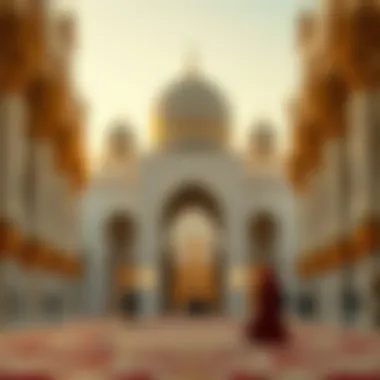

Social gatherings are abundant on this day. Neighbors visit each other, exchanging greetings and food, reinforcing the sense of community. Much like Eid al-Fitr, children receive Eidiyah or presents, further embedding the spirit of generosity that Eid embodies.
As families reflect on values of sacrifice, gratitude, and community, Eid al-Adha stands out as a celebration that not only commemorates a historical event but also strengthens the bonds that tie Emiratis together in a fast-evolving landscape.
In summary, the differences between Eid al-Fitr and Eid al-Adha highlight the rich tapestry of Emirati culture. These celebrations contribute to an understanding of social cohesion and community interaction, vital not solely for the cultural resonance but for the economic activity they stimulate in the UAE.
Eid Holiday Timings in the UAE
Understanding the timing of Eid holidays in the UAE isn't just about knowing when to mark your calendar. It plays a pivotal role in how families and communities plan their celebrations and business operations during this significant occasion. The announcement of Eid holidays triggers a series of preparations. From travel plans to the bustling shops gearing up for increased customer traffic, each detail hinges on when these holidays fall.
Eid is more than just a day off; it reflects the rhythm of life in the UAE. As investors or business professionals, keen awareness of these dates can inform strategies for market engagement during peak seasons and optimize opportunities within various sectors such as retail and real estate.
All in all, understanding Eid holiday timings becomes essential for anyone connected with the UAE's economy and cultural landscape. It's an opportunity to appreciate the synchronization between tradition and modernity.
Official Announcements and Dates
In the UAE, the dates for Eid holidays are typically announced by governmental authorities well in advance. Usually, this takes place just after the moon sighting, which signifies the end of Ramadan or the start of Eid al-Adha, based on the lunar calendar. The official announcements serve as a guideline for public sector employees, educational institutions, and private enterprises.
"The precise determination of Eid dates reflects not just religious observance, but also national unity across the UAE."
Local media outlets and government websites are the go-to resources for confirmation. This ensures that everyone stays in the loop, whether it’s scheduling family gatherings or planning an extravagant feast. Here’s how it typically unfolds:
- Announcement made: Usually a day or two before the Eid holiday, giving the public enough time to prepare.
- Variations for different sectors: Public sector might get longer holidays compared to private sectors, which can vary according to each organization’s policy.
- Community festivities: Local mosques and community centers usually host events that coincide with the holiday announcement, enriching the community’s celebration experience.
Real estate agencies and hospitality businesses also watch these dates closely, preparing for the influx of visitors and the associated economic activities.
Variability in Dates: Lunar Calendar Impacts
The UAE follows the Islamic lunar calendar, which is around 10 to 12 days shorter than the Gregorian calendar. This means that Eid dates shift annually, creating variability that requires everyone to stay on their toes.
For many locals and expatriates alike, this yearly shift is accepted with grace, yet it does introduce complexities in planning. Investors can see this as a double-edged sword: while it may help in forecasting trends in tourism and retail, it can also mean frantic last-minute adjustments in scheduling and operations.
Here are key points illustrating the impact of lunar calendar variability on Eid celebrations:
- Unpredictable planning: Businesses often need to prepare for varying holiday lengths, especially when organizing sales or events.
- Travel considerations: Many residents plan trips abroad during these holidays, affecting airline bookings and hotel reservations, often resulting in a boom for the tourism sector.
- Cultural adaptability: The shifts challenge both locals and expatriates to adapt, blending traditional celebrations with contemporary practices as adjustments have to be made on short notice.
In summary, the complex nature of Eid holiday timings emphasizes the need for keen awareness and flexibility in strategies, ensuring individuals and businesses alike can navigate these essential cultural observations with both respect and efficiency.
Eid Traditions and Celebrations
Eid traditions and celebrations are at the heart of the festive experience in the UAE. They not only reflect the rich cultural heritage of the nation, but also illustrate the importance of community and familial bonds. These traditions can be seen as a bridge connecting the past with the present, helping to maintain a sense of identity in an ever-changing world. In delving into these customs, one finds a tapestry woven with threads of sacred rituals, abundant feasting, and the spirit of giving.
Common Customs: Prayer and Charity
One of the foundational pillars of Eid celebrations in the UAE lies in the religious customs surrounding the prayer and acts of charity. On the morning of Eid, individuals partake in a special prayer known as Salat al-Eid. This takes place in large congregations, often held in mosques or open fields, where families gather to express gratitude to God for the blessings received.
Attending these prayers is not merely a ritual; it's an experience of togetherness and community spirit. The collective chant of "Allahu Akbar" echoes through the atmosphere, cultivating a profound sense of unity among participants.
Charity, or Zakat al-Fitr, is another significant aspect of these celebrations. Before feasting begins, families contribute a portion of their wealth to those less fortunate, ensuring that everyone can partake in the joyous occasion. This act of giving reinforces the Islamic principle of compassion and solidarity across different socioeconomic strata.
Family Gatherings and Feasting
Eid is synonymous with family gatherings, wherein families unite to share delectable meals. The culinary landscape is diverse, featuring dishes that vary not just from family to family, but also between regions within the UAE. Staples like lamb biryani, kebabs, and dates adorn tables, while fragrant Arabic sweets become a customary treat.
During these gatherings, stories are exchanged and laughter punctuates the air. The essence of Eid is not just about the food, but rather the love and warmth that pervades these moments. Families often prepare special dishes passed down through generations, preserving culinary traditions that celebrate their heritage.
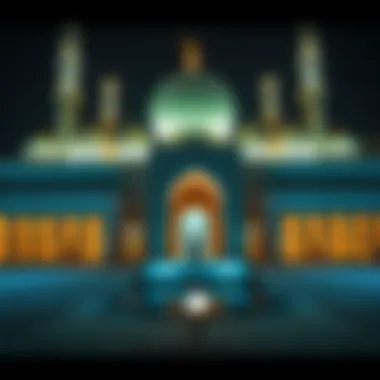

Feasting on Eid symbolizes abundance, gratitude, and joy, making every meal a celebration in itself. Customarily, the dining experience extends beyond just one day, sometimes spanning several as families continue to spread cheer and hospitality to guests.
Gifts and Festivities
Gift-giving during Eid is a cherished tradition that adds an extra layer of excitement to the celebrations. Adults often give gifts in the form of money or Eidiyah to children, fostering a sense of joy among the younger generations. The simple act of wrapping a gift or preparing a small surprise can strengthen bonds and create lasting memories.
Festivities extend beyond gifts; they often encompass vibrant street celebrations, cultural performances, and elaborate fireworks that can light up the night sky. In cases, like the Global Village celebrations or Dubai Shopping Festival, special events are tailored to encapsulate the festive atmosphere of Eid, drawing residents and tourists alike.
"Eid is a time for both personal reflection and community engagement, bringing together various cultural expressions into a seamless blend."
These traditions and celebrations during Eid in the UAE not only highlight the significance of faith but also embrace modern expectations, marking it as a period of joy that transcends generations.
For further readings on Eid traditions, you may refer to Wikipedia and Britannica.
Impact of Eid Holidays on the UAE Economy
Eid holidays are not just significant for individuals and families across the UAE; they also play a pivotal role in the country's economy. The celebrations during Eid can yield numerous economic benefits, from increased consumer spending to boosts in tourism. Understanding this impact is crucial for investors, buyers, and sellers in the UAE market.
Tourism Boost During Eid
When Eid rolls around, there’s a noticeable increase in tourism across the Emirates. It's a time when many expatriates return home, and this influx creates bustling local economies. Hotels often report full bookings, with travelers eager to experience the festivities.
Tour operators capitalize on this period by offering special packages that showcase cultural experiences. Events such as fireworks displays in Dubai and traditional music concerts grab the attention of both locals and visitors alike. According to recent reports by the UAE's Department of Tourism and Marketing, tourism revenue can surge by as much as 30% during Eid, with travelers flocking to iconic attractions like the Burj Khalifa and the Louvre Abu Dhabi.
- Families also take the opportunity to explore the UAE's diverse attractions.
- Food festivals pop up, showcasing both local and international cuisines.
- This tourism boost contributes significantly to employment in the service sector, benefitting everyone from hotel staff to artisans selling souvenirs.
Retail Sales and Consumer Behavior
Retailers in the UAE eagerly anticipate the Eid season. During this period, consumer behavior shifts dramatically, showcasing a notable increase in spending. From clothing to home appliances, families often indulge in shopping sprees, spurred by traditional practices of gifting and celebration.
Several major brands offer special discounts or exclusive collections leading up to Eid to attract consumers. Malls become lively spaces for promotions and events, effectively turning shopping into a festive occasion. As predicted by the Dubai Chamber of Commerce, retail sales can rise by over 20% as Eid approaches, highlighting a significant pattern in consumer behavior.
Furthermore, this is a time for many to purchase new clothing and gifts for loved ones:
- Perfumes and jewelry become standout purchases.
- Grocery stores see a spike in sales of traditional food items, preparing lavish feasts.
What’s intriguing is how this surge mirrors not just the celebration itself but also reflects deeper social connections and familial bonds.
Real Estate Market Trends During Eid
Interestingly, the real estate sector also sees fluctuations influenced by the Eid holiday. During this time, there are multiple events like property expos designed to attract potential buyers and investors. The festive mood encourages people to explore options for new homes, whether for personal use or investment, given the anticipation of future growth post-Eid.
The rental market experiences a spike as well, particularly in popular areas:
- Families returning for the holiday seek short-term rentals, swaying market dynamics.
- Developers often report a spike in inquiries about properties in desirable locations, with many taking advantage of the tax holidays and low-interest rates during this celebratory period.
“Eid is about community and sharing; its economic impact creates opportunities that resonate through various sectors, revitalizing the market.”
The interplay between these elements forms a complex yet harmonious relationship that underscores the need for potential real estate investors and market players to remain aware of these seasonal ebbs and flows.
For more insights on the economic impact of Eid, visit Dubai Chamber of Commerce and other related resources.
Eid and Social Cohesion in the UAE
Eid celebrations in the UAE represent not just a religious observance but a binding thread that intricately weaves together the fabric of Emirati society. The communal aspects of Eid go beyond merely gathering to share a meal or exchanging gifts; they play a pivotal role in nurturing social cohesion among various demographics within the country.
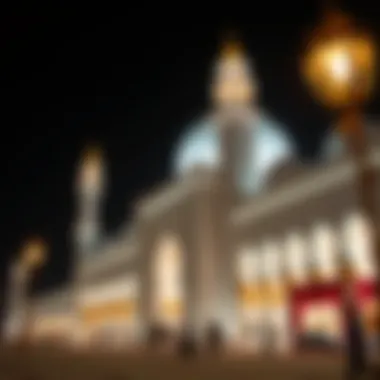

During these holidays, festive activities foster a sense of belonging. People from diverse backgrounds come together, putting aside their differences to celebrate shared values and traditions. This is where the essence of Eid shines brightly, bridging cultural gaps and strengthening the community at large.
Community Events and Engagement
Community engagement during Eid holidays takes many forms—from large public prayers to vibrant festivals dotted around cities like Dubai and Abu Dhabi. Local authorities, along with community groups, host a variety of events that encourage participation across age groups and backgrounds.
The open global nature of the UAE means that various expatriate communities also join in these celebrations, sharing their own traditions alongside Emirati customs. This melting pot environment not only enriches the experience but also reinforces the principle of unity in diversity.
"Eid is a time for coming together, whether you're from Manila, any European country, or right here in the UAE. It makes you feel part of something bigger."
Moreover, charitable activities are a major feature of these events. Many individuals and organizations participate in food drives, donations, and social services aimed at those in need. This act of giving during such a joyful occasion reflects the deep-rooted value of compassion within Emirati culture.
Role of Eid in Strengthening Family Bonds
At the heart of the Eid celebration lies the importance of family. Many perceive Eid as an opportunity to reconnect, not just with immediate family but also with extended relatives. This tradition of visiting family members plays a crucial role in reinforcing familial relationships.
Families often engage in rituals such as preparing traditional meals together and exchanging sweets and gifts. These activities create lasting memories and strengthen inter-generational ties.
The practice of visiting the elders in the family isn’t merely a formality; it is a significant expression of respect that teaches younger generations the importance of family traditions and values. When family members gather and share stories about past Eid experiences, it helps foster a sense of legacy that cements their identity.
Eid thus is not just an event; it is an invaluable part of the social structure in the UAE that enhances familial connections while promoting social unity. Everyone involved leaves with renewed energy and a sense of purpose to nurture these bonds further.
By focusing on these aspects of Eid, the UAE exemplifies how cultural practices can serve to unite a nation, reinforcing solid social frameworks while embracing modernity.
Challenges and Modern Adaptations
As the cultural fabric of the United Arab Emirates rapidly transforms, the celebration of Eid faces a myriad of challenges. These span from the influences of urbanization to shifting social norms. Understanding how these challenges intersect with modern adaptations provides valuable insight for investors, developers and anyone interested in the socio-economic dynamics of the UAE.
Evolving Traditions in a Modern Context
Over the years, the once strictly traditional celebrations of Eid have witnessed substantial modifications due to the influx of technology and the fast-paced urban lifestyle.
- Balancing Old and New: While certain customs remain intact, such as the communal prayers and family gatherings, many families have started embracing digital means for ascertaining prayer times and connecting with loved ones abroad. This blending of tradition with technology is reshaping how Eid is observed.
- Influence of Social Media: Platforms like Instagram and TikTok have become integral to Eid celebrations, with users sharing their experiences through posts and stories. This provides a space for individuals to showcase their cultural heritage while also adapting to newer forms of interaction, altering how younger generations relate to traditions.
The duality of maintaining cultural authenticity while adapting to modern technology is a delicate balance. The elders often reminisce about the past, while the youth innovate—turning to apps and online platforms to foster communal experiences.
Impact of Globalization on Eid Celebrations
Globalization has inevitably shaped Eid celebrations in the UAE, introducing both opportunities and challenges.
- Diverse Influences: As the UAE attracts expatriates from across the globe, the local celebrations have become multicultural. This blending of traditions can be enriching. You'll find cuisines from different parts of the world gracing festive tables—from Asian biryanis to continental pastries.
- Commercialization of Eid: There’s also the challenge of commercialization. Businesses leverage the season to boost sales, often overshadowing the spiritual significance of the occasion. Black Friday-like sales during Eid can lead to excessive consumerism, straying from the values of charity and gratitude that are central to Eid.
- Changing Norms: Traditional practices such as the communal sacrifice on Eid al-Adha are evolving. As awareness around animal rights grows, some families opt for alternative methods of contributing to charity, choosing to aid those in need rather than perform the physical act of sacrifice.
Finale: The Enduring Legacy of Eid in the UAE
Eid celebrations in the UAE are not just periods of festivity; they encapsulate the rich tapestry of cultural values, social unity, and communal identity that define Emirati society. The significance of Eid goes beyond mere religious observance; it is a time for reflection, gratitude, and reconnection—among families, friends, and even strangers. In the bustling landscapes of Dubai or the quiet expanses of Al Ain, the shared experiences of these holidays shape not only personal relationships but also societal norms and interactions.
Reflections on Cultural Values and Community
During Eid, the values that resonate deeply in Emirati society come to the forefront. Hospitality, generosity, and the spirit of togetherness are palpable in every gathering and celebration. Families often prepare elaborate feasts, showcasing local dishes that tell stories of heritage and tradition. Visiting relatives and sharing meals are common, reinforcing familial bonds and strengthening community ties.
Moreover, charity plays a pivotal role during these festivities. It is customary to engage in acts of giving, whether by supporting local charities or directly assisting those in need. This emphasis on charity not only helps those less fortunate but also encourages a sense of responsibility among community members. Such acts build a network of compassion that is vital for social harmony in the UAE.
"Eid is more than just a holiday; it’s important to our traditions and our people. It brings us together, strengthens our bonds, and reminds us of what truly matters in life."
The Future of Eid Celebrations
Looking forward, the future of Eid celebrations in the UAE holds both potential and challenges. As the nation continues to evolve, influenced by modernization and globalization, there’s a balance to strike between preserving traditional values and embracing new ideas. The integration of technology in celebrations is one area showing significant growth.
For example, social media platforms like Facebook and Instagram enable families and friends to connect virtually, extending their celebrations beyond physical boundaries. This has led to unique expressions of Eid, where digital greeting cards and live-streamed prayers have become commonplace.
However, challenges also abound. As younger generations navigate their identity within a rapidly changing society, some may drift from traditional practices. Maintaining cultural integrity might require active engagement from community leaders to promote the significance of shared customs and heritage.







